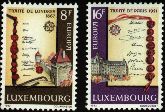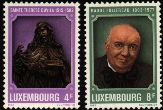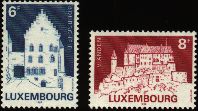
|
Luxembourg Stamps
|

|
Luxembourg Stamps
|
| February 25 | Grand Duke Jean -- Definitive (16 F) |
| February 25 | Landscapes in the Four Seasons |
| February 25 | National Monument of the Resistance and Deportation |
| May 4 | Europa 1982 -- Treaties |
| May 4 | St. Theresa of Avila and Raoul Follereau |
| May 4 | Buildings -- State Museum and Synagogue |
| September 9 | Castle Restoration -- Bourscheid and Vianden |
| September 9 | International Youth Hostel Federation -- 50th Anniversary |
| September 9 | Worldwide Scouting -- 75th Anniversary |
| September 9 | Monument of Civilian and Military Deportation |
| December 6 | Town Arms II (Caritas Issue) |

These stamps depict landscapes by Luxembourg artists showing scenes in each of the four seasons:

The Luxembourg resistance was organized soon after the Nazi occupation on May 10, 1940. Its repression was brutal and terrible -- thousands of patriots were arrested, imprisoned, deported, or thrown into concentration camps. More than 1,600 Luxembourgers passed through the Hinzert deportation camp and many died there. Shortly after the war, the remains of those who died there were returned to Luxembourg for burial in the Notre-Dame cemetery. A special cross was erected made from the boards of the huts of the Hinzert camp. On May 10, 1969, the Deportation Monument, a statue of the "Political Prisoner" by Luxembourg sculptor Lucien Wercollier, was placed near the cross.

The Europa theme of "historical events" is supported by these two stamps. The first shows the seals and signatures of the Treaty of London of 1867. By this treaty the European powers declared that Luxembourg should be a perpetually neutral state and that the fortress be dismantled forthwith. The second stamp shows the signature page of the Tready of Paris of 1952. This treaty formed the basis of the European Coal and Steel Community headquartered in Luxembourg.

St. Theresa of Avila was born in 1515 and entered the Carmel of the Incarnation monastery at Luxembourg Cents at the age of 21. She ultimately established several other Carmels, mostly in her native Spain. Theresa was also a great writer and communicated clearly to her students. She was canonized by Pope Gregory XV in 1622 and in 1970 Pope Paul VI proclaimed her a doctor of the church.
Raoul Follereau (1903-1977) dedicated his life to the fight against leprosy and other human suffering.

The State Museum is located in the heart of the old city of Luxembourg. It holds thousands of historical items -- archaeological findings, ancient coins and medals, industrial art, and paintings and sculptures. It was awarded the European Museum Prize of 1980.
The Synagogue was opened in 1953 and is situated on Avenue Monterey in the park. It replaces the original synagogue built in 1894 which was destroyed by the Nazis during World War II.

Bourscheid and Vianden are perhaps the two most imposing castles in Luxembourg and both have undergone significant restoration in recent years. The Bourscheid castle dates from the 10th century and occupies a spectacular position high above the Sûre River below. The ancient Vianden castle, the most popular tourist attraction outside of Luxembourg City, is now almost completely restored and its Gothic halls often host important cultural events.
[Bourscheid castle maximum card]
[Vianden castle maximum card]

The International Youth Hostel Federation was formed in 1932 by 11 national associations. Today, youth hostels provide 30 million nights in 5,000 buildings in 66 countries around the world.

The Scouting movement was founded by Robert Baden Powell in 1907 in London. Today scouting exists in 150 countries and territories and has about 26 million members. In 1982, Luxembourg had about 7,000 scouts.

On August 30, 1942, the Nazis imposed conscription into the Germany army of Luxembourg men born between 1920 and 1924. Despite widespread protests and strikes, which were quashed by firing squads, civilian deportees and forced conscripts started leaving Luxembourg via the Hollerich station in September and October 1942. Of the 15,000 people affected, about 3,500 died or disappeared. The monument, shown on the stamp, was placed in front of Hollerich station on October 5, 1975.

These stamps feature the coats of arms of four local authorities as well as a Nativity scene: